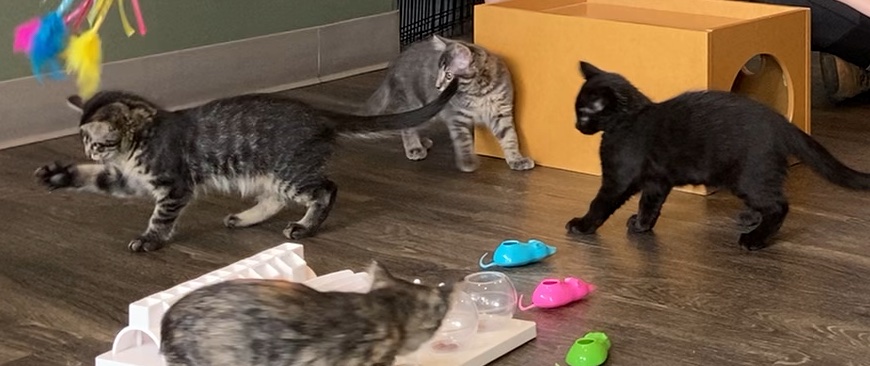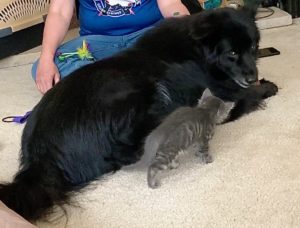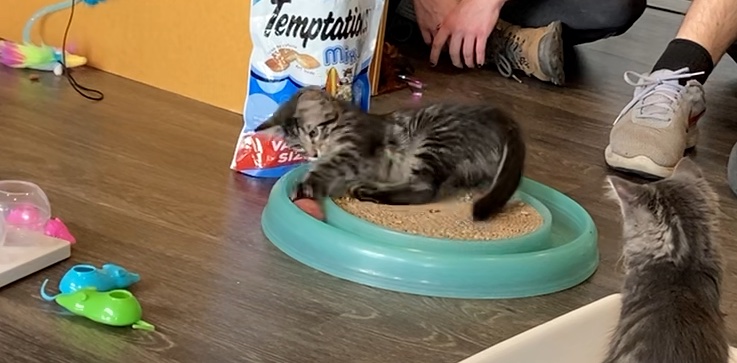
It’s fun to watch a litter of kittens chasing and pouncing on each other. Are you thinking of bringing some of that cuteness and energy to live at your house?
Kittens that have been handled in a positive way by a variety of people during their sensitive period (2-7 weeks) are tolerant of people and usually make good pets. However, socialization continues past the 7 week mark.
Kittens older than 7 weeks in a wild cat colony would be spending time with their litter mates, mother, other female cats (babysitters) and maybe some indulgent males. They will be learning the body language of older cats and how to communicate with them.
When we adopt a kitten at 8-10 weeks, we interrupt the socialization process. There is some evidence that kittens who stay with their mothers and siblings until 12 weeks of age are more friendly with other cats and humans.
Rescue organizations already struggling to maintain facilities will incur more costs keeping kittens later. Is there a way to continue socializing kittens once they have joined their adopting household?
Resident Animals
Socializing kittens can continue if kittens join a household with well-socialized older cats and other pets, e.g. dogs. A word of caution here: It can be risky to introduce small kittens to adult cats and dogs.
Kittens practice fighting postures such as the arch and sidestep when they play with littermates. As kittens reach 12 weeks or so, the arch and sidestep are seen less frequently – possibly the kittens are starting to identify these postures as aggressive, as part of a cat fight. An older cat who has little experience with kittens, may interpret this activity as aggressive and react defensively, possibly injuring the kitten.
If you are in this situation, slow, gradual introduction is best until you know how the cats or dog are going to behave.
- A barrier between the kitten(s) and older cat(s) or dog for the early visitations is a must.
- A helper is also essential.
Cats: You may want to consider using carriers or harness and leash when you reach supervised visitations (IF the cats are COMFORTABLE in their carriers and are COMFORTABLE with harness/leash).
Dogs: When you reach supervised visitations, make sure your dog has a comfortable harness to wear, is leash-trained, and is reliable with “down”, “stay”, “leave it” and a pay attention cue. If he gets too excited, you must be able to lead him out of the visitation area.
socializing kittens: making good memories
Kitten kindergarten is a program aimed at socializing kittens 8-12 weeks old. Kitten kindergarten tries to continue the socialization that began earlier during the sensitive period by offering exposure to a variety of humans and well-behaved adult cats and dogs. We hope to leave our kittens with some good memories that they can draw on later in life when confronted with human and animal visitors to their household.
Kitten kindergartens – Where?
- in the spring
- veterinary clinics
- rescue organizations
- typically runs weekly for 4 weeks
Who can come?
- kittens 8-12 weeks of age
- kittens older than 12 weeks may not be as accepting of interaction with other cats
- the information and training still applies to older cats
- if your cat is older, it may be worth seeing if you can attend virtually or without a cat.
Pre-Requisites for kindergarten
- at least one FVRCP vaccine 5-7 days prior to the first class
- dewormed
- a negative FeLV/FIV test
The syllabus in kitten kindergarten can vary depending on who is offering the course, whether it is a veterinary clinic or rescue group. It typically will address cat handling, cat care (grooming, nail trims), and basic training, including harness and carrier training.
The goal of kitten kindergarten is not just socializing kittens – owner education is a big part of this program. Make sure to take advantage of the expertise of the class moderators and ask questions!


